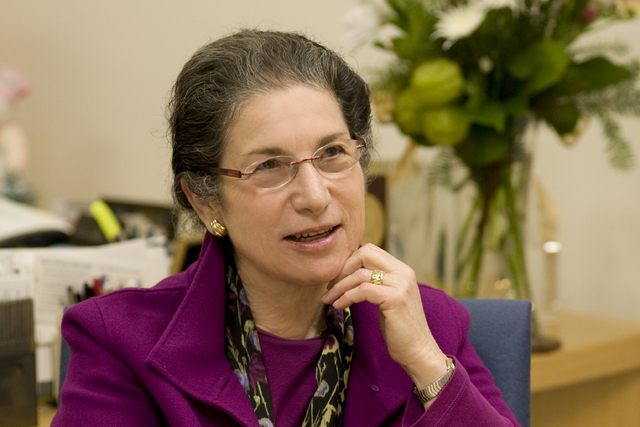Aging U.S. up against crisis in cancer care

WASHINGTON — The U.S. is facing a crisis in how to deliver cancer care, as the baby boomers reach their tumor-prone years and doctors have a hard time keeping up with complex new treatments, government advisers reported Tuesday.
The caution comes even as scientists are learning more than ever about better ways to battle cancer, and developing innovative therapies to target tumors.
And while doctors try to optimize treatment, the Institute of Medicine found “daunting” barriers to achieving high-quality care for all patients. Overcoming those challenges will require changes to the health care system, and savvier consumers.
“We do not want to frighten or scare people who are getting care now,” said Dr. Patricia Ganz, a cancer specialist at the University of California, Los Angeles, who chaired the panel.
But too often, decisions about cancer treatments aren’t based on good evidence, and patients may not understand their choices and what to expect, the panel found. For example, some studies suggest that two-thirds or more of cancer patients with poor prognoses incorrectly believe the treatments they receive could cure them.
Topping the list of recommendations is finding ways to help patients make more informed decisions, with easy-to-understand information on the pros, cons and costs of different treatments.
“The patient can’t be passive,” Ganz said. “It’s an important partnership that we need.”
The risk of cancer increases with age, and older adults account for just over half of the 1.6 million new cases diagnosed each year. By 2030, new diagnoses are expected to reach 2.3 million a year as the population ages. The report warns there may not be enough oncology specialists to care for them.
Perhaps a bigger concern is the growing complexity of care. Increasingly, scientists are finding genetic differences inside tumors that help explain why one person’s cancer is more aggressive than another’s. More importantly, that also means certain cancer drugs will work for, say, lung cancer in one person but not the next.
“If your doctor doesn’t know that, or your hospital doesn’t do the test, you don’t have that opportunity” for newer, targeted therapies, Ganz said. But, “we are living in an information age where it’s impossible to keep up.”
It’s not just a matter of knowing the latest treatments, but deciding if they’re worth it for an individual patient. Consider: Of 13 cancer treatments approved by the Food and Drug Administration last year, only one was proven to extend survival by more than a median of six months, the report said. The drugs all cost more than $5,900 for each month of treatment.
For older adults, treatment decisions may be even more complicated — because the studies that test different therapies don’t include enough people over age 65, who tend to have multiple health problems along with cancer, Ganz explained.
Nor are cancer teams doing a good enough job in educating and training patients’ loved ones to offer the at-home care that many need for long stretches of time, she said.
The Institute of Medicine advises the government about health issues. Among its recommendations are: more research to tease out how to best treat different patients; new strategies to help doctors keep up with that evidence; and development of tools to help communicate the choices to patients so they understand what really may happen to them.
In the meantime, the panel had some advice for people who need to know if they’re getting quality care now. Take the time to research care options and get a second opinion, Ganz stressed. Among the questions to ask:
—How long does the average person with this cancer live?
—What is my likelihood of a cure?
—If I can’t be cured, will I live longer with treatment? How much longer?
—Will this care directly treat the cancer, or improve my symptoms, or both?
—What are the side effects?
—Am I healthy enough to try this treatment, or will my other health conditions and medications interfere?
—How many times have you done this procedure?
—What does the care cost?
—Am I eligible for clinical trials?
If your health team doesn’t have answers, “you need to find another set of providers,” Ganz said.
DRUG SHOWS PROMISE
WASHINGTON — The Food and Drug Administration has issued a positive review of a breast cancer drug from Roche that could soon become the first pharmaceutical option approved for treating early-stage disease before surgery.
In documents posted online, FDA scientists said women who received the drug Perjeta as initial treatment for breast cancer were more likely to be cancer-free at the time of surgery than women who received older drug combinations. Although the results come from mid-stage trials of the drug, FDA scientists recommended accelerating approval of the drug.
That step is reserved for groundbreaking drugs to treat life-threatening diseases.
Perjeta was first approved last summer to treat women with a subtype of breast cancer that has already spread to other parts of the body. But Roche’s Genentech unit is now seeking approval to use the drug at a much earlier stage of the disease: after diagnosis and before surgery to remove the tumor.
Surgery to remove tumors is the first step in treating virtually all forms of cancer. If approved, Perjeta would be the first cancer drug approved for use as a pre-surgical step. Using cancer drugs before surgery is still experimental, but doctors hope the approach could help shrink tumors to make them easier to remove. In some breast cancer cases, a tumor that is easier to operate on could allow women to keep their breasts, rather than having them surgically removed.












